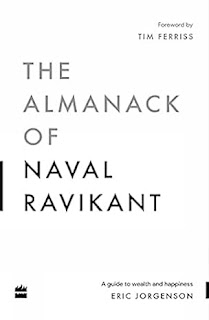Happiness is Learned-Day-12-25 Day Reading Challenge-The Almanack of Naval Ravikant
Don’t take yourself so seriously. You’re just a monkey with a
plan.
Ten years ago,
if you would have asked me how happy I was, I would have dismissed the
question. I didn’t want to talk about it.
On a scale of
1–10, I would have said 2/10 or 3/10. Maybe 4/10 on my best days. But I did not
value being happy. Today, I am a 9/10. And yes, having money helps, but it’s
actually a very small piece of it. Most of it comes from learning over the
years my own happiness is the most important thing to me,and I’ve cultivated it
with a lot of techniques.
Maybe happiness is
not something you inherit or even choose, but a highly personal skill that can
be learned, like fitness or nutrition.
Happiness is a very evolving thing, I think, like all the great questions. When you’re a little kid, you go to your mom and ask, “What happens when we die? Is there a Santa Claus? Is there a God? Should I be happy? Who should I marry?” Those kinds of things. There are no glib answers because no answers apply to everybody. These kinds of questions ultimately do have answers, but they have personal answers. The answer that works for me is going to be nonsense to you, and vice versa. Whatever happiness means to me, it means something different to you. I think it’s very important to explore what these definitions are.
For some people I know, it’s a flow state. For some people, it’ssatisfaction. For some people, it’s a feeling of contentment. My definition keeps evolving. The answer I would have given you a year ago will be different than what I tell you now.
Today, I believe
happiness is really a default state. Happiness is there when you remove the
sense of something missing in your life. We are highly judgmental
survival-and-replication machines. We constantly walk around thinking, “I need
this,” or “I need that,” trapped in the web of desires. Happiness is the state when
nothing is missing. When nothing is missing, your mind shuts down and stops
running into the past or future to regret something or to plan something.
In that absence,
for a moment, you have internal silence. When you have internal silence, then
you are content, and you are happy. Feel free to disagree. Again, it’s
different for everybody.
People mistakenly believe happiness is just about positive thoughts and positive actions. The more I’ve read, the more I’ve learned, and the more I’ve experienced (because I verify this for myself), every positive thought essentially holds within it a negative thought. It is a contrast to something negative.
The Tao Te Ching says this more articulately than I ever could, but it’s all duality and polarity. If I say I’m happy, that means I was sad at some point. If I say he’s attractive, then somebody else is unattractive. Every positive thought even has a seed of a negative thought within it and vice versa, which is why a lot of greatness in life comes out of suffering. You have to view the negative before you can aspire to and appreciate the positive.
To me, happiness is not about positive thoughts. It’s not about negative thoughts. It’s about the absence of desire, especially the absence of desire for external things. The fewer desires I can have, the more I can accept the current state of things, the less my mind is moving, because the mind really exists in motion toward the future or the past. The more present I am,the happier and more content I will be. If I latch onto a feeling, if I say, “Oh, I’m happy now,” and I want to stay happy, then I’m going to drop out of that happiness. Now, suddenly, the mind is moving. It’s trying to attach to something. It’s trying to create a permanent situation out of a temporary situation.
Happiness to me is mainly not suffering, not desiring, not thinking too much about the future or the past, really embracing the present moment and the reality of what is, and the way it is.If you ever want to have peace in your life, you have to move beyond good and evil.


Comments
Post a Comment